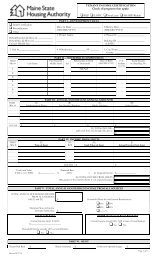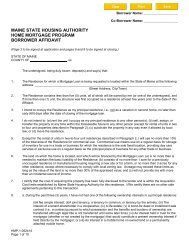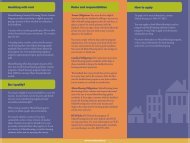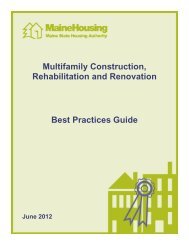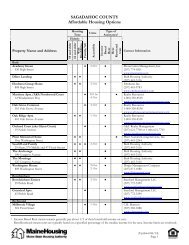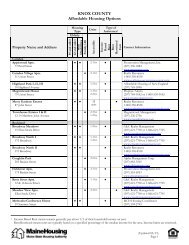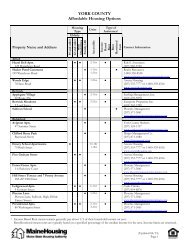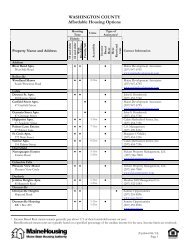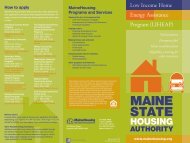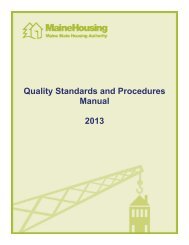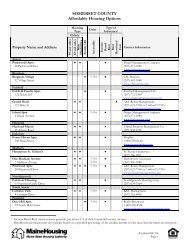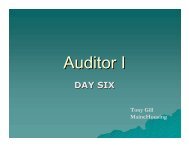Rental Housing Guide - Maine State Housing Authority
Rental Housing Guide - Maine State Housing Authority
Rental Housing Guide - Maine State Housing Authority
You also want an ePaper? Increase the reach of your titles
YUMPU automatically turns print PDFs into web optimized ePapers that Google loves.
esidentiallandlord/tenant laws<strong>State</strong> law contains specific rights and protections for tenants(people who are renting housing). Tenants are protected fromunsafe housing, unfair evictions, discrimination, mishandling ofsecurity deposits, and other abuses.Tenants may be required to take certain actions to be protectedunder the law, actions which are designed to balance the legalrights of landlords (owners of rental housing) with the legalrights of tenants.A landlord may require a tenant to enter into a written agreement,called a lease, when the tenant rents an apartment or house fromthe landlord. A written lease can benefit tenants and landlordsif the terms of the lease are clear and fair. Tenants should readcarefully the whole lease and understand their obligations underthe lease before signing it.A tenant can request that a landlord enter into a lease, but thelandlord has no obligation under the law to do so. In many cases,there is no written lease between the landlord and the tenant,which is called tenancy at will. Most of <strong>Maine</strong>'s landlord/tenantlaws are designed to protect tenants when there is no writtenlease and apply only to tenancies at will.Some of these laws apply whether or not there is a written lease.Even though tenants and landlords may enter into a lease thatcontains provisions that are different than the law, tenants cannotagree to waive certain basic protections given to them by thelaw, no matter what is in the lease. For example, a landlord anda tenant may agree that the landlord can terminate the lease andevict the tenant without a reason by giving less than 30 days'written notice (which is required by law for tenancies-at-will),but the landlord cannot forcibly eject the tenant by changingthe locks on the door or removing the tenant's furniture fromthe apartment even if the tenant agrees that the landlord cantake such actions in the lease. Only a law enforcement officercan force the tenant to leave and only after the tenant has a courthearing and the court orders that the tenant be evicted.The following resources provide information on <strong>Maine</strong>'s law andtenants' rights and obligations under the law:• Pine Tree Legal Assistance publishes The Rights of Tenantsin <strong>Maine</strong>, an easy-to-read handbook on landlord/tenant lawswith helpful tips for tenants. For more information, landlordsand tenants may visit the Pine Tree Legal Assistanceweb site at www.ptla.org/tenants.htm, or call a Pine Tree LegalOffice located near them. See Page 15.• The <strong>Maine</strong> Attorney General's Office publishes the ConsumerLaw <strong>Guide</strong>, a technical summary of the law with referencesto the specific statutes. The <strong>Guide</strong> includes chapters onconsumer rights when renting an apartment (Chapter 14),consumer rights when living in a mobile home (Chapter 15),and a model landlord-tenant lease (Chapter 16). For more12information, landlords and tenants may visit the AttorneyGeneral's web site at www.maine.gov/ag and click on ConsumerLaw <strong>Guide</strong>, or call 1 -800‐436 -2131.If landlords or tenants have any questions about their rights andobligations under the law or a lease, they should contact an attorney.If they cannot afford an attorney, a list of legal aid agenciesis included on Page 15 of this <strong>Guide</strong>.The following are general suggestions for tenants:• Tenants should carefully read the whole lease and understandtheir obligations under the lease before signing it. Ifthey do not understand a provision in the lease, they shouldask the landlord to explain the provision, and if necessary,rewrite the provision in the lease to make it clear.• Tenants should remember that a written lease is an agreementbetween the tenant and the landlord, so if there issomething that is important to the tenant, he or she shouldmake sure that it is written into the lease.• When tenants move into a rental unit, they should make alist of all of the existing defects in and damage to the apartment.Tenants should provide the landlord with a copy ofthe list, and if possible, get the landlord to acknowledge thelist by signing it. Tenants also should keep a copy of the listfor their records. This will protect tenants in the event thelandlord claims that any of the defects or damages on the listwere caused by the tenant.• Tenants should get a receipt from the landlord for all securitydeposits and rental payments and keep the receipts untilthey have satisfied all of their obligations under the lease,even if they are not living in the apartment (e.g., they havemoved but are still obligated to pay rent under the lease). Thelandlord is required by law to give the tenant a receipt for allcash payments, which includes payment by check.• All notices, agreements, understandings, changes, and complaintsshould be made in writing and should be dated andsigned. Tenants should keep a copy of all written items givenby the tenant to or received by the tenant from the landlord.• Tenants should make sure that the landlord has their correctmailing address, including a forwarding mailing address,when they move out of the apartment. Many of the tenantprotections under the laws contain notice requirements.If the landlord gives the tenant written notice at “the lastknown address” (which may not be the current address), thelandlord may have satisfied his or her obligation under thelaw even if the tenant never received the notice.• Tenants are responsible for their guests and their behavior.For example, tenants will be held responsible for all damageto their apartment and any disturbance caused by theirguests. If the tenant's guest brings a dangerous pet to thetenant's apartment or the property on which it is located andthe pet threatens or harms the landlord or other tenants, thetenant will be held responsible.• Tenants should see The Rights of Tenants in <strong>Maine</strong>,a publication by Pine Tree Legal Assistance atwww.ptla.org/rights-tenants-maine, for more helpful tips.



